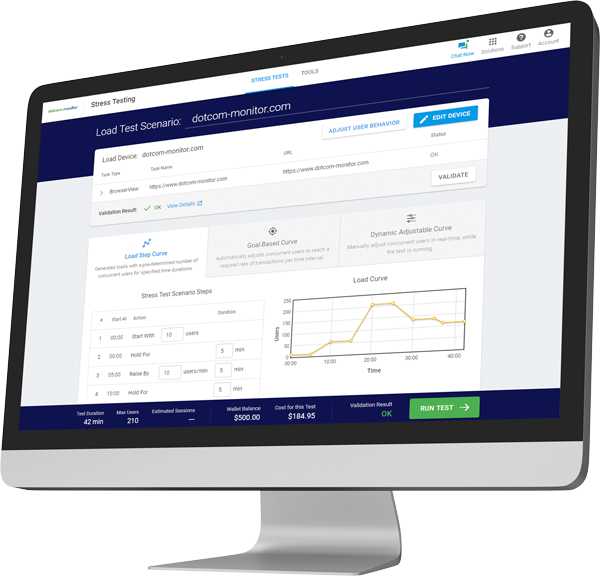“Quality planning consists of developing the products and processes required to meet customer’s needs.”
– Joseph Juran
Load testing consultants like our company at LoadView have the tools, resources, and skills necessary to ensure your software performs at the highest level. To forego load testing can lead to lackluster software performance and ultimately a loss of revenue for your business. Let’s take a look at what load testing is and both if and when it makes sense to hire a load testing consultant.
What Is Load Testing?
Before deciding if hiring a load testing consultant is the best decision for you, it’s important to understand what load testing is and how it can benefit you and your projects. Though there are many different elements to load testing, the idea is relatively simple:
“A load test is a planned test to perform a specified number of requests to a system to test the functionality of the system under specific levels of simultaneous requests. A load test ensures that a web system can handle an expected volume of traffic, and therefore is sometimes referred to as volume testing. The goal of a load test is to prove that a system can handle the expected volume with minimal to acceptable performance degradation.”
– LoadView
To simulate a “load” of real-life users accessing a given server, virtual users (VU) are generated. Load testing sets out to assess the performance of servers and locate deficiencies in performance, such as potential bottlenecks that might slow down your software and negatively impact user experience.
Load testing:
- Ensures an application has the capability and performance to handle at least 1,000 users at the same time.
- Locates and expose potential bottlenecks.
- Verifies whether the performance claims made by a specific piece of software are accurate.
- Tests and compares at least two systems and determines which is the best.
- Measures stability and performance when traffic is congested.
If these issues are not addressed, poor performance can turn away users of your website or application. No one wants to spend a lot of time on a slow, lagging website, much less one that doesn’t load at all. A crashed website results in damage to your brand and loss of revenue.
“Performance tests mainly verify the speed and reliability of an application and are divided into load tests (goal based) and stress tests. Since the rise of agile development methods, being able to reproduce load testing results has become a top priority.”
– LoadView-Testing.com
There are other forms of performance testing, often divided between goal-based testing and stress testing.
- Endurance testing: This is a unique test that reveals how software responds to an increase in extended levels of user traffic.
- Scalability testing: This tests how your software scales up/down depending on various levels of users.
- Spike testing: Spike testing shows how your software responds to a sudden increase in user load.
- Volume testing: Also known as flood testing, this test seeks to set your software up against large amounts of data to see how it responds and performs during a surge of activity.
Though load testing might seem like to be a chore, there are real-world examples of disastrous consequences for software that was not properly load tested. Anyone responsible for the performance of an online application or website needs to take load testing into consideration at every stage of development, or risk negative user experience or outright downtime, all of which can be avoided through proper load testing.
 Load Testing Case Studies & Research
Load Testing Case Studies & Research
In 2020, the Iowa Caucus released a mobile application that allowed users to vote without having to show up in person. But the application failed because it only reported partial information, which was later attributed to a “coding issue” in the “reporting system.” This not only presented an inconvenience to potential voters, but it made the app-based voting process unreliable. This could have been avoided with proper load testing.
Another incident, in 2020, included Heathrow Airport in England. An IT failure caused even more issues after delays were compounded by poor weather.
You can read more about the economic advantages of load testing, and you can review this article to learn more about the importance of load testing when it comes to software development.
Time and time again, it’s been proven worthwhile to load test your software. It can save a lot of hassle and frustration in the long run and prevent costly downtime and “fire drill” situations like the ones mentioned above.
This is not to say that proper load testing is simple or that anyone can do it without proper training and experience. This is ultimately why a load testing consultant is often helpful, as they can help you quickly and professionally execute load testing in anticipation of unexpected events. You don’t know what you don’t know, and a load testing consultant will bring both expertise and a fresh perspective to your specific circumstances.
“Through specialized testing software, load testing places a simulated “load” or demand on your web application to ensure it remains stable during operation. During a load test, testing software will measure the capacity of your web application via transaction response times. If your app features extended response times or becomes unstable at a certain level of simulated traffic, your software will have likely reached its peak operating capacity—which means a solution to this software bottleneck needs to be addressed and implemented.”
– Microfocus
Common Challenges When Load Testing
There are several factors that may dissuade people from completing a load test. Proper load testing is not as simple as merely running a test. It takes time, budget, resources, and expertise.
Here are a few potential challenges to proper load testing:
- Some load testing tools require a license. This can be costly.
- Even with open-source options such as JMeter, proper load testing still requires an environment very similar to your real-world application environment, which requires a budget.
- Load testing with some tools requires the ability to write load test scripts in the tool’s supporting script language. This takes a specific skillset to do properly – again, you may not have budgeted for this and might not have a ready resource with this ability. At LoadView we offer point and click scripting, so no coding experience is required to simulate real user behavior.
- If a load test is not properly designed, it can provide false results, which in turn can lead you to take inappropriate steps to unnecessarily reengineer your application. With bad information, you may waste money and resources.
Load testing can be intimidating for those who don’t have the resources or financial capabilities. This is where load testing consulting with our help at LoadView comes in.
Load Testing Consultants: LoadView by Dotcom Monitor
At LoadView by Dotcom Monitor we offer a simple five-step process that will provide you with the most important information related to load testing your application or website.
Here is the five-step process:
Discovery Call
- Understand the nature of your business
- Explore the most relevant test scenarios
- Discuss timeline and deliverables
Data Gathering
- Collect necessary data from Business Intelligence (BI) software
- Map user journeys
- Collect and analyze traffic patterns
- Build required test for your software
Executive Stress Test
- Load testing experts will work with your team to construct custom stress and load testing services that are uniquely built for your situation
Analyze Test Results
- Analyze collected data
- Incorporate findings into a performance testing plan
Review Call
- Review the testing objectives and performance results
- Review optimization recommendations with stake-holders to guarantee peak performance and sufficient scalability of your product
Even if you’re not sure about whether to load test your software, it might still be a good idea to schedule a discovery call just to see where you stand. The old adage holds true: it’s better to be safe than sorry. Everyone has blind spots, and a new perspective from an unbiased expert will likely bring to light issues you may not even know you have with your website.
Our Load Testing Consultants at LoadView Are Ready
You can schedule a discovery call with LoadView by Dotcom Monitor here. Our experts will be able to fill you in on how to move forward and support you throughout the load testing process.
